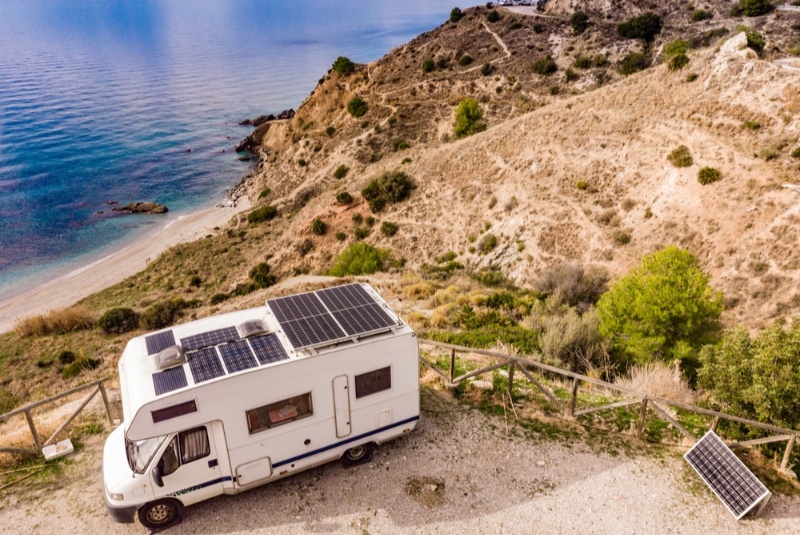Exploring the great outdoors in an RV or camper offers a sense of freedom and adventure, and integrating high-efficiency solar panels can enhance this experience by providing sustainable power wherever you roam. This guide will walk you through selecting the best solar panels for your mobile living setup, ensuring you have reliable and efficient energy on the go.
Understanding Solar Panel Technology
Solar panel technology revolves around converting sunlight into electricity through photovoltaic (PV) cells. For RVs, two main types dominate the market: monocrystalline and polycrystalline. Monocrystalline panels, made from a single, continuous crystal structure, are more efficient at converting sunlight due to their purity, making them ideal for areas with limited space like RV roofs. They also perform better in low-light conditions, which can be crucial during overcast days. Polycrystalline panels, while slightly less efficient due to their fragmented silicon crystal composition, offer a more budget-friendly option and still perform adequately for most recreational vehicle needs. Understanding these differences is essential for choosing the right type of panel based on your power needs, budget, and space constraints.
Assessing Your Energy Needs
Before investing in solar panels, it’s important to calculate your daily power usage. List all the electrical devices you plan to use in your RV, including lights, appliances, and electronics, and estimate their consumption in watt-hours. This total will guide the minimum output your solar panels need to generate each day. Considering occasional overcast weather, it’s advisable to add a buffer to your calculations to ensure your energy needs are met even on less sunny days. This preparatory step is crucial in selecting the right size and number of panels to meet your energy demands effectively.
Selecting the Right Type of Solar Panels
Choosing between monocrystalline and polycrystalline panels largely depends on your specific needs. Monocrystalline panels, with their higher efficiency and sleeker aesthetic, might be more suitable if space is at a premium on your RV’s roof and you require maximum power output. On the other hand, polycrystalline panels could be a better choice if you have more space available and prefer a more cost-effective solution. Additionally, thin-film solar panels, known for their flexibility and lightweight, might be considered if your RV roof cannot support heavier panels or if you seek a low-profile appearance.
Considering Panel Size and Weight
The physical characteristics of solar panels are significant for mobile installations like RVs. Check the dimensions and weight of the panels to ensure they will fit on your RV’s roof without adding excessive strain on its structure. Heavy or overly large panels might require additional reinforcement of the roof, which can add to the installation complexity and cost. Ideally, your selected panels should balance power output with a size and weight that your vehicle can comfortably accommodate.
Evaluating Efficiency and Output
High-efficiency solar panels ensure that you maximize the electrical output per square inch of your limited roof space. Look for panels that offer at least 18% efficiency, a standard for high-quality monocrystalline panels, which can provide sufficient power in smaller spaces. The panel’s rated output, measured in watts, indicates how much power it can produce under ideal sunlight conditions. Matching this output with your calculated energy needs is essential to ensure your solar system will be capable of powering your RV’s daily activities.

Durability and Weather Resistance
Durability is a critical consideration for solar panels, particularly when exposed to the diverse environmental conditions encountered during RV travels. Look for panels that are specifically rated for outdoor use, with certifications for resistance to wind, hail, and heavy rains. The panel frames should be corrosion-resistant, particularly if you travel near the ocean or in high humidity areas. Such build quality ensures your solar panels can endure long-term exposure to the elements, providing reliable service for many years.
Installation Requirements and Flexibility
The ease of installation and the ability to expand your solar system later are important factors to consider. Some solar panel kits are designed for DIY installation, offering plug-and-play convenience that can save significant costs. However, complex systems might require professional installation. Also, consider choosing a system that allows for easy expansion. As your energy needs grow or technology improves, you might want to add more panels; having a flexible system from the start makes this process simpler and more cost-effective.
Maintenance and Longevity
Minimal maintenance requirements are a plus for any solar panel system, especially when used in an RV setting. Panels that only need periodic cleaning to maintain efficiency and do not require frequent technical adjustments are ideal. Longevity is equally important; high-quality solar panels should have a lifespan of at least 25 years. Most reputable manufacturers will back their products with a warranty that covers significant periods of the panels’ expected life, providing peace of mind about your investment.
Cost Considerations
While the initial cost of solar panels can be substantial, it’s important to weigh this against the potential savings on fuel and electricity costs over the lifespan of the panels. High-efficiency panels, although more expensive upfront, may provide greater long-term savings by maximizing power production. When comparing prices, consider not only the cost of the panels themselves but also the installation and any necessary supporting equipment, such as inverters and batteries.
Assessing Additional Features and Accessories
Some solar panels come with enhanced features that can add value to your installation. Integrated microinverters, for example, optimize the conversion of solar energy at each panel, increasing overall efficiency. Systems with monitoring technology allow you to track your power production and consumption in real-time, helping you make the most efficient use of your solar power. These features, while potentially increasing the upfront cost, can significantly enhance the usability and efficiency of your solar power system.
By thoroughly considering these detailed aspects, you can make an informed choice on the best high-efficiency solar panels for your RV or camper, ensuring that your travels are powered sustainably and reliably. This guide equips you with the knowledge needed to invest wisely in a solar solution that suits your mobile lifestyle and energy needs.




